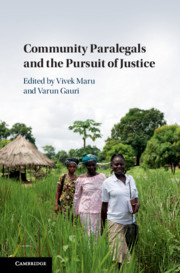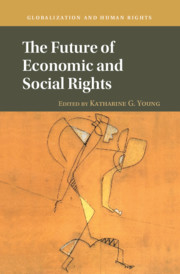Courting Social Justice
Judicial Enforcement of Social and Economic Rights in the Developing World
$44.99 (P)
- Editors:
- Varun Gauri, The World Bank
- Daniel M. Brinks
- Date Published: March 2010
- availability: Available
- format: Paperback
- isbn: 9780521145169
$
44.99
(P)
Paperback
Other available formats:
Hardback, eBook
Looking for an examination copy?
This title is not currently available for examination. However, if you are interested in the title for your course we can consider offering an examination copy. To register your interest please contact [email protected] providing details of the course you are teaching.
-
This book is a first-of-its-kind, five-country empirical study of the causes and consequences of social and economic rights litigation. Detailed studies of Brazil, India, Indonesia, Nigeria, and South Africa present systematic and nuanced accounts of court activity on social and economic rights in each country. The book develops new methodologies for analyzing the sources of and variation in social and economic rights litigation, explains why actors are now turning to the courts to enforce social and economic rights, measures the aggregate impact of litigation in each country, and assesses the relevance of the empirical findings for legal theory. This book argues that courts can advance social and economic rights under the right conditions precisely because they are never fully independent of political pressures.
Read more- This book is a first-of-its-kind, five-country empirical study of the causes and effects of social and economic rights litigation
- The research strategy is a structured comparison of five countries: Brazil, India, Indonesia, Nigeria, and South Africa
- The book develops new methodologies for analyzing the sources of and variation in social and economic rights litigation
Reviews & endorsements
"Human rights are meaningless if they cannot be claimed. The formal court system is playing an increasingly important role in enforcing human rights claims in many countries, frequently with life-saving impacts, as part of the overarching institutional architecture and social mobilization for human rights accountability. Gauri and Brinks have produced a timely, distinctive and important comparative empirical analysis of prerequisites for effective legal claims to socio-economic rights, and their social policy implications. I have no doubt that this book will appeal to a wide readership of public policy makers, economists, social scientists and lawyers, transcending stale theoretical dichotomies between rights of different kinds and showing vividly what a cross-disciplinary field human rights has become."
--Louise Arbour, UN Commissioner for Human RightsSee more reviews"Judicial enforcement of social and economic rights has generated much theoretical controversy but little empirical work. Gauri and Brinks have taken a giant step forward with this methodologically innovative volume. The chapters fit together seamlessly, and provide a host of comparative and theoretical insights into the causes and consequences of judicial intervention in social and economic rights. The result is a major contribution to the literatures on rights, judicial power and social change, and the role of law in development."
--Tom Ginsburg, Professor of Law, University of Chicago Law School"...The book offers a comparative analysis of five countries, South Africa, Brazil, India, Nigeria and Indonesia. Each case is rich in empirical data, as well as relevant social and political factors...This book is written to be accessible to both the serious empirical scholar of law and justice, as well as anyone interested in social justice and the protection of rights for disadvantaged populations. The ideas presented offer academics, scholars, and activitsts, alike, the possibility of applying theoretical and empirical analysis to their own practices to further social justice... Overall, this book successfully merges theoretical analysis regarding the courts as policy makers and their ability to protect rights with empirical data through the case studies..."
--Jamila Smith-Loud, Department of Government & Politics, University of Maryland, The Law and Politics Book Review [Vol. 19 No. 5 (May 2009)]"For decades now, governments and commentators have debated at a level of stunning abstraction whether economic and social rights are really rights, and whether courts could or should adjudicate them. At last Gauri and Brinks have brought to the debate a sophisticated empirical analysis of the experience in key countries. The result is a thoughtful, original, and deeply insightful comparative study." - Philip Alston, John Norton Pomeroy Professor of Law, New York University School of Law
"The detailed, well-documented, and distinctive country studies offer rich empirical accounts in their own right. Bookended by the editors' efforts to explain the role and impact of legal actors and institutions in the development of SE rights, the country chapters work to both expose diverse legal landscapes and uncover the circumstances that give rise to legalization."
Perspectives on Politics, Helena Silverstein, Lafayette CollegeCustomer reviews
Not yet reviewed
Be the first to review
Review was not posted due to profanity
×Product details
- Date Published: March 2010
- format: Paperback
- isbn: 9780521145169
- length: 384 pages
- dimensions: 229 x 152 x 20 mm
- weight: 0.51kg
- contains: 9 b/w illus. 13 tables
- availability: Available
Table of Contents
1. Introduction: the elements of legalization, and the triangular shape of social and economic rights Varun Gauri and Daniel M. Brinks
2. Litigating for social justice in post-apartheid South Africa: a focus on health and education Jonathan Berger
3. Accountability for social and economic rights in Brazil Florian F. Hoffmann and Fernando R. N. M. Bentes
4. Courts and socio-economic rights in India Shylashri Shankar and Pratap Bhanu Mehta
5. The impact of economic and social rights in Nigeria: an assessment of the legal framework for implementing education and health as human rights Chidi Anselm Odinkalu
6. The implementation of the rights to health care and education in Indonesia Bivitri Susanti
7. A new policy landscape: legalizing social and economic rights in the developing world Helen Hershkoff
8. Transforming legal theory in the light of practice: the judicial application of social and economic rights to private orderings Daniel M. Brinks and Varun Gauri.
Sorry, this resource is locked
Please register or sign in to request access. If you are having problems accessing these resources please email [email protected]
Register Sign in» Proceed
You are now leaving the Cambridge University Press website. Your eBook purchase and download will be completed by our partner www.ebooks.com. Please see the permission section of the www.ebooks.com catalogue page for details of the print & copy limits on our eBooks.
Continue ×Are you sure you want to delete your account?
This cannot be undone.
Thank you for your feedback which will help us improve our service.
If you requested a response, we will make sure to get back to you shortly.
×




